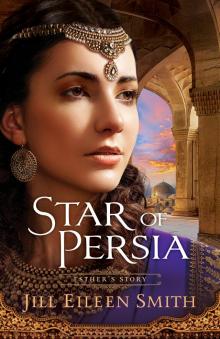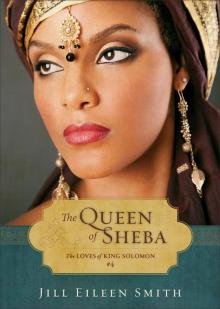- Home
- Jill Eileen Smith
Redeeming Grace: Ruth's Story Page 3
Redeeming Grace: Ruth's Story Read online
Page 3
“How did it go?” Naomi saw his brows dip, his lips curve in a telltale frown. Of late, Elimelech’s mood had often been sour.
He sat on a bench opposite her. Naomi stood. She could spare a few moments before baking the bread for the evening’s meal. She sat beside him and took his hand. “You are troubled.”
He nodded, then pulled the dusty turban from his head. “Boaz is ever the dreamer. Even dealing with a grieving wife he thinks we can somehow save all of the crops, despite the drought.” He looked at her. “He is not thinking clearly or wisely.”
Naomi searched her husband’s gaze. He was a practical man, but also one who carefully watched what belonged to him. Where Naomi would give to the poor, Elimelech would warn her not to give too much. It had been a point of contention between them on and off for years.
“Tell me what he said.” She knew Boaz had not been himself since Adi had lost the child because Adi had not been herself either. He had tried to coax her out of her sadness, but nothing he did seemed to help, and Naomi found herself trying to come up with ways to make the girl smile again. Still, she had faith in Boaz. Surely his plan was not so strange as to prove impossible.
“He wants to hire every able man and woman, citizen and alien, to draw water from the well near the gate and water every wheat and barley field throughout our territory.” He looked into her eyes. “Can you imagine the cost of such a project? Who does he think is going to pay these workers? And with no rain, the well will run dry. We should be preserving the water we have, not foolishly pouring it on dry ground that will yield little.”
“Father is right,” Mahlon said, coming closer to join the conversation. “He told us of Boaz’s plan when we met him coming from the fields. The crops are already dying of thirst.”
“But perhaps Boaz has a point,” she said, wanting to defend him, even if it meant disagreeing with her men. “If we don’t try to save what is left, what will we eat? The whole town cannot survive on water alone.” How would she help the widows and orphans that so often depended on her for care?
Elimelech studied his hands, and she noticed how worn they seemed. This drought worried him, and as he was ten years her senior, she wondered if the added burden was taking a toll.
“Perhaps the people would work for the food we would save,” she said, longing to give him hope. “Surely the famine will not last another season.”
“I suppose you have a point,” Elimelech conceded, looking at her once more. “We will do it Boaz’s way this time.” But she could see the furrowed brow, the doubt in his gaze.
She patted his knee. “Adonai has been gracious to us. Until now we have had more than enough. It only seems right to encourage those without to help us help them. Do you not think so?” She smiled into his eyes, saw the way they softened at the edges. She breathed a soft sigh. He would listen to her. This time.
“You sound exactly like Boaz. Though Melek agreed with me, and we both have the wisdom of years on our side, dear wife. Boaz speaks rationally, but one look at the man will tell you that he is only half listening when people speak. Melek and I only half agreed because Boaz seemed to need us to do so. But I warn you, Naomi. His grief or the grief of his wife will not be a good enough excuse next time.” He paused, looking around at their small family, and cleared his throat. “If our God withholds rain from us next year as well, I will not stand by and waste our precious seed on ground that will not grow it.” He crossed his arms as though his mind had been made up long ago, a sign of his stubbornness.
Naomi stared at him, eyes narrowed, a sense of dread rising within her. “What exactly will you do if not plant and hope and pray for rain? We must plant before the rains come. You cannot know whether God will grant the rain or not. That’s why we plant in faith.”
But Elimelech was already scowling. “We will still have grain, even if I save the seed.”
“What are you talking about?” Naomi looked from her husband to her sons, but Mahlon and Chilion seemed equally curious. Clearly Elimelech had told them nothing.
“I am talking about working the harvest of others. Of gleaning and helping to bring in the crop.”
“And where do you expect to go that the drought would not reach?” She heard the rising anxiety in her tone and silently told herself to relax. There was nothing to worry about yet.
“Moab has need of workers, and the land near the Dead Sea gets steady rainfall even if we don’t.” Elimelech stretched out his hand to her and grasped her cold fingers. “Do not fear, my love. I will take the boys and go there and work their fields—once Boaz sees that we will harvest very little here. At least then we will be assured of enough to last us until the next season.”
She felt his grip, but the warmth of his hand would not penetrate the sudden chill working through her whole body. “Moab?” He would take her sons to work among their enemies? A people who not so long ago had oppressed Israel for eighteen years?
Elimelech nodded. “Since we defeated their king and their men, I have heard from traveling merchants that attitudes toward Israel have changed. I am sure they would welcome our able help.”
“This year?” She could not wrap her mind around his words. “You would leave me alone and travel to a foreign land?”
“We would not be gone long.” He patted her arm. “Do not fret about it now, my love. If things turn out better than I expect here, then we will go next year. If the need arises.” He moved to the bench along the wall near the door of the house. A servant came to wash his feet.
Naomi stayed where he’d left her, staring into the distance.
“Just think about it, Naomi.”
She shook herself, resolve stiffening her back. “If it comes time that the famine grows so bad we must seek food elsewhere, you will not go without me.”
He met her gaze across the court, and for a moment she thought he would object. “Very well,” he said at last. “When the time comes, we will go together.”
If the time comes, Naomi amended, but did not voice the words. Pray God that time never came.
4
Spring 1296 BC
Ruth lifted the water jar to her shoulder and fell into step with Orpah, the breeze gentle against their faces. The winter rains had filled the large jars near their homes, but they were nearly depleted now and must be restored. Ruth was glad for the chance to walk to the Arnon and slip away from the squabbling of her mother, Shiphrah, and younger sister, Susannah.
“You seem rather pensive today,” Orpah said, glancing her way. She looked up at the bright blue skies. “How can you possibly have any reason not to smile on such a gorgeous day?”
Ruth looked at her friend and gave her the smile she craved. “Is that better?”
Orpah laughed. “Only if you tell me why you are not skipping for joy to leave the village. We’ve been cooped up during most of the rainy season. I’ve hardly seen you.” She kicked a stone and laughed again. “Tell me you’ve missed me. You know you have.”
“All right. I’ve missed you. I am glad to get out of the house.” Ruth chuckled, but the effort felt forced.
Orpah looked at her and lifted a curious brow. “Trouble at home again?”
“Isn’t there always?”
Orpah gave Ruth a knowing look. “Is your mother back to pushing Te’oma on you?”
Ruth nodded, her mind drifting to times long past, to places she did not wish to go.
The war of her childhood had gone on for weeks, and her father had assured her one morning that things were turning in Moab’s favor. “I’ll be back before nightfall,” he’d said, then kissed her cheek and slipped out of the house that was one of many noblemen’s homes on the main streets of Kir-Hareseth.
But hours later, before the sun had crested the horizon, one of the lesser nobles, a man Ruth had never met though she had played with his children, entered their home and convinced her mother to follow him. Ima did so and ordered five-year-old Ruth to follow.
When she couldn’t move for the fe
ar that still woke her at times in the night, the man’s son grabbed her hand.
“Come on, Ruth,” Te’oma had said as a volley of arrows hit the side of one of the palace outbuildings. “We have to follow my father.”
“Do you ever think back to that day?” Ruth glanced at Orpah, who had lived on that same nobleman’s street and also lost her father in the fight.
Orpah stopped walking, though the Arnon was just over the next rise. “I dream of it sometimes. But I don’t have the constant reminder of it that you do.”
“I wish Aali had never become governor. I wish my mother had never followed him even if we did escape to Dibon.” Ruth looked beyond Orpah to a copse of trees lining the banks. “I wish I had never met Te’oma.” A sigh escaped and she sought her friend’s gaze. “Susannah is barely six, yet she already plays as though she is a mother and begs a neighbor boy to be the father. My mother stops the play, not even allowing the child to pretend to marry until I agree to wed Te’oma. Of course she thinks the match is a good one.” She turned and began walking again toward the river. “Why couldn’t my mother have remarried someone worthy of her and not given herself as mistress to that man?”
“He saved your lives. Your mother had no other way to repay him.” Orpah shrugged as if the idea was of no consequence, for her mother had done the same with a different elder in Dibon. “You could do worse, you know.” Orpah fell into step with Ruth as they began walking again. “If you don’t want to wed Te’oma, say the word. Maybe he’d give me a second look.” She laughed. “I’d be happy to live in a wealthy household with servants to do all of the work.”
“He might have been a fun playmate as a child, but he has grown into an arrogant and foolish man,” Ruth said, shaking her head. “He frightens me with some of the cruel things he says. I could never marry him.”
Orpah met her gaze. “Most men are arrogant and all men are foolish. That’s why it’s up to us to train them.” Her expression turned dreamy. “You have to admit he’s comely to look upon. And I daresay he would be like clay in your hands.”
Ruth laughed, a cheerless sound. “Oh, stop it. If his mother hasn’t taught him better manners than he displayed last year at the olive harvest, nothing I can say will improve his character.” She looked deeply into her friend’s dark eyes, knowing Orpah would regret this, but Ruth could not deny her—not if she truly wanted Te’oma. “If you want him so badly, ask your mother to arrange it. I will not stand in your way.” She turned and hurried down the bank to the river’s edge.
Orpah quickly caught up with her. “You seriously don’t care? Everyone expects you to wed him by next summer.”
Ruth stood watching the water rush past on its way toward the sea. She loved this spot, especially during the festivals to Chemosh. The rush of water helped drown out the music that never quite hid the screams of those meant for sacrifice. Or of the mothers whose babies were taken. She shuddered at the memories. So many women never recovered even if they went on to have other children. Others acted as though all was well, but they grew bitter and snapped at everyone when they grew old.
“I don’t care what everyone expects, Orpah. My mother is not married to Governor Aali, and I do not have to accept her choice. At least not for another year.” By twenty she would have to choose someone, for she could not stay in her mother’s house forever. Everyone knew women were meant to marry, like it or not. Or live with a man willing to support her. Her mother had been a concubine to her real father, with little of the benefits of a true wife, but since his death she had been in the even worse position of mistress to the governor—belonging but not belonging. All that remained of her father was that last kiss on her cheek and his promised return. So much had faded with time.
“If not Te’oma, then who would you have your mother pick?” Orpah dipped her jar into the water, allowing it to fill, as Ruth did the same.
Ruth pulled the jug onto the grassy spot on the bank and sat for a moment, letting the damp breeze tickle her face. “I don’t know. There are so few honorable men in this village. Every man lies to his neighbor. The governor”—she lowered her voice and looked quickly about—“and those who work under him would take a man’s hard-earned grain or seed or gold when his back is turned.”
Orpah gave her a strange look. “But it has always been this way. Would you remain unmarried?”
Ruth studied the grasses beneath her feet, then pulled one from its roots. “I don’t know why these things trouble me, Orpah. Truly, I don’t. It is the way of our village, and my mother agrees with it all. But something inside of me keeps hoping that someone will come to town, perhaps with the next caravan, and take me away from all of this.” She swept her hand in an arc toward the town. “Is there no place on earth where men respect each other’s work, each other’s things, each other’s women?” She glanced at her friend. “I know, it sounds foolish to dream such things. But while I love the beauty of this land and I would miss my sister—and perhaps my mother—I would not miss Moab or its festivals or its arrogant men.”
Orpah looked out over the water. The Arnon was too wide to cross without knowing how to keep afloat as one could do easily in the Dead Sea. Many a mother whose child Chemosh had claimed had thrown herself into these very waters.
“Do you fear you will be one of those women?” Orpah settled beside her and played with a blade of grass. “I think about that often. I know you think me flighty and never serious, but I fear that if I marry the wrong man, we will be chosen—I will be chosen—to give up my first child.” She met Ruth’s gaze. “I don’t think I could do it.”
Ruth studied her friend in silence. “It is exactly why I cannot marry Te’oma.”
“But with all of their wealth—and with the priest’s ear—aren’t they the ones who do the choosing? The governor would not allow his grandchild to be offered. It is the poor, like us, who are chosen.” Orpah’s voice had risen in pitch, though her words were just above a whisper.
“But can the priests be trusted? Even with all Governor Aali’s gold, if the priests choose . . . they say Chemosh plays no favorites. Even King Eglon, when he lived, offered the son of a concubine on that brazen altar.” Ruth shuddered at the very thought. The tale had been passed down—something that had happened long before she was born—but it troubled her just the same. “I would run away the moment my son was born. I would not even wait until he was named.” Ruth said it to make it so. But she wondered, if the time came, whether she would be allowed to do as she pleased.
“It would be better if we had girls,” Orpah said, her tone sardonic. “At least we are spared such fate most of the time.”
“Unless the gods randomly choose differently than we are used to.” Ruth leaned close. “It is why I fear the gods of our people. I fear them and I despise them. But I dare not say so to another soul.” She touched Orpah’s arm. “Promise me you will not repeat our words.”
Orpah nodded, though her eyes grew wide. “Do you think the gods know? Would they hold it against us for saying such things?”
The fear Ruth often fought slithered through her as the two of them gripped each other’s hands, gazes locked. “I don’t know. Perhaps the river has masked our voices and the gods cannot hear,” she said, hopeful.
Orpah nodded. “Perhaps Chemosh is sleeping.” She leaned in and hugged Ruth. “But to be safe, let us speak no more of this. We do not want to awaken his wrath.”
Ruth returned her friend’s embrace, and the two stood in silence. “Yes, let us talk of other things.” They lifted the jars to their shoulders and returned home.
5
Two Years Later
1294 BC
So it had finally come to this. Naomi turned in a circle, taking in the brightly embroidered cushions, the woven rugs, the clay jars, and the low table where she had placed food for more than twenty years. How could she possibly leave this place? What should they take with them?
Ziva, an old widowed servant whom Naomi had hired to help with chores, en
tered the room. What would the woman do now without Naomi to help her?
“The men have loaded the cart with all of the cooking utensils I gave them, mistress. Do you want me to roll up this rug or just the bed cushions?”
Naomi looked again at all of the items that held so many memories. So few would fit in the cart.
She shook her head. “No, nothing from this room. We will take the bedrolls and the water jars. Did you pack the spindle and distaff and the small loom?” The big loom would have to stay. If they were in Moab long, Elimelech could build her a new one. But if she had any say in the matter, they would only be there a season.
“Yes, mistress. I packed all that and more. The smaller grinding stone and the three-pronged griddle, the jars of barley and wheat and olives and dates, and the skins of wine.”
Naomi faced the woman, saw the lines of sorrow along her brow. How could she leave such a faithful servant? “I want you to stay here while we are away. Use the things that are left. Plant what you can in the small garden area, eat the food, and if you have any left, help those in need.” She touched Ziva’s arm. “When I return, I will replenish whatever you have used.” The garden and house were the only part of their land Elimelech had not sold to their closest neighbor to fund their trip. He knew, as did everyone else, that the land could not be permanently sold, and planned to reclaim it in seven years.
Would they really be gone so long? A knot twisted in Naomi’s stomach at the very thought, but her attention turned back to the woman whose eyes now filled with tears.
“You are sure, mistress?”
Naomi swallowed back her own emotion and held her close. “Very sure. I would not leave you homeless.”
She turned away and walked through the courtyard toward the street, where Elimelech and her sons waited with a donkey hitched to a cart and a small flock of goats following. The old woman came through the house a few moments later and lifted the bedrolls onto the back of the cart.
“Are we ready?” Elimelech looked at her, then glanced at the lightening sky. Dawn had barely crested the horizon, but they had packed much the night before. The sacks of dates and jars of olives, the harvesting equipment, and the few extra clothes they owned were tucked into the corners of the cart.

 Star of Persia: Esther's Story
Star of Persia: Esther's Story The Shepherdess
The Shepherdess Abigail (The Wives of King David Book #2): A Novel
Abigail (The Wives of King David Book #2): A Novel The Queen of Sheba
The Queen of Sheba Michal
Michal Rebekah
Rebekah A Passionate Hope--Hannah's Story
A Passionate Hope--Hannah's Story Daughter of the Nile
Daughter of the Nile Rachel
Rachel Sarai
Sarai Redeeming Grace: Ruth's Story
Redeeming Grace: Ruth's Story The Desert Princess
The Desert Princess The Prophetess - Deborah's Story
The Prophetess - Deborah's Story